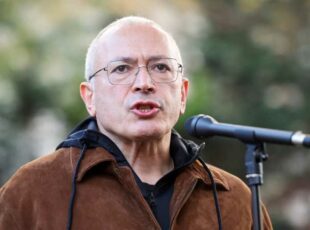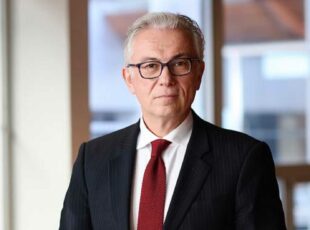We Cannot Allow Authoritarianism to Pass to a New Clan
Mikhail Khodorkovsky speaks at the Russia Forum in Vilnius on May 18.

The economic stagnation that has gripped Russia for the last two years continues to bring about a significant decline in living standards. It is impossible for this fact not to show itself in the public mood. The government’s popularity is in decline, yet Putin still enjoys sturdy ratings.
Nevertheless, this “synthetic rating” has lost its quality.
43 of the 82% support that Putin lays claim to is not support for the status quo, but rather the result of a lack of an alternative.
People want a change of government, but they also feel that the country does not have the necessary forces to replace the regime. This impression is created by state propaganda, but it is a weak one; society is searching for an alternative and will inevitably find one.
Putin is on the retreat in Europe, the Netherlands, and now France. The USA has an unpredictable Trump and in China he’s experiencing mild humiliation.
The question has arisen in Russia: should Vladimir Putin participate in the elections? The #Enough campaign raised this question, and Navalny challenged the Prime Minister and the electoral machine.
Everything began to move much quicker.
It would have been a mistake to hope that the current regime would be changed through the coming elections against the will of the Kremlin. Russian society is not as young as it is in other countries where the “colour revolutions” took place. The people are not ready to risk their lives and the government is willing to pull the trigger.
In reality I see three scenarios: 1) Putin stands again for president, wins, and leaves either in 2024, or a little earlier; 2) he doesn’t stand for election, and selects a successor; 3) he stays for life.
The second scenario is optimal for the country in its current condition, as well as for Putin himself. The third scenario is a terrible one, and will end in a coup; however both of these are improbable outcomes. The opposition must work on the assumption that the first scenario will take place.
The fundamental task is not to allow today’s authoritarianism to be passed on to a new clan. This would be pragmatically the best option both for Putin and for Russia. Any new autocrat is unlikely to tolerate this kind of scenario.
In such an event, the transition to a parliamentary or, at least a presidential-parliamentary model, which was crushed in 1993, is the best outcome both for today’s elite, as well as for Russia as a whole.
Putin can maintain serious influence, and, of course, immunity, and Russia at last will receive a modern government.
The surprising thing is that the barrier which blocks this path is not only the corrupt elite’s fear that they will face trial, but also parts of the democratic community who want to send them there. It is those who see the solution to the problem as replacing an evil Tsar with a good one.
It is those who believe it’s possible to obtain power in an autocratic structure, creating a system of checks and balances only after power has been obtained; it is those who do not understand that a system of checks and balances is based exclusively on independent sources of legitimacy.
I have been through this a number of times.
A good Tsar comes along and it’s a miracle. A leader, seizing power and then limiting it voluntarily, that’s also a miracle. A centre of power not based on strength, again, a miracle. Miracles happen, but to rely on them is a foolish bet.
It is precisely for this reason that I am supporting the creation of range of independent political organisations with their own funding and their own sources of support in society; organisations ideologically and structurally independent which are able to work as a coalition.
A coalition is undoubtedly what is needed both in order to obtain power and conduct political reforms, rather than an opposition monopoly standing off against the monopoly of the regime.
What distinguishes a coalition from affiliated groups is the following: they develop policy independently, they have independent support groups, they are self-financed and eventually form an independent government cabinet.
It is only through the daily habit of seeking consensus, through the constant necessity to form a consensus of support between allies that it is possible to create an alternative political model which will be replicated by a modern, democratic form of government.
I’m not interested in a supreme leader, or an influential figure standing next to a new supreme leader. There is not a single reason that I would aid anyone in continuing the autocratic tradition.
I, in contrast to Putin and his ideological allies in our camp, do not believe there is such thing as an ideal person. I believe in governmental and public institutions, in a system where there is an independent judiciary, an influential parliament, strong local self-government and a functioning civil society.
I believe that Russia will be a part of Europe. However, for now we have to find a place for the idea of this new Russia in Europe, and present it to the world. The European dream is an important part of the Russian dream.
It would be worth holding a serious conference of European intellectuals in order to establish a conception of a transitional period for both Russia and Europe.
I know that to form such a pluralistic, European model of government is possible only now, while access to power is in the future, otherwise it will already be too late.
Together we can make this happen.



